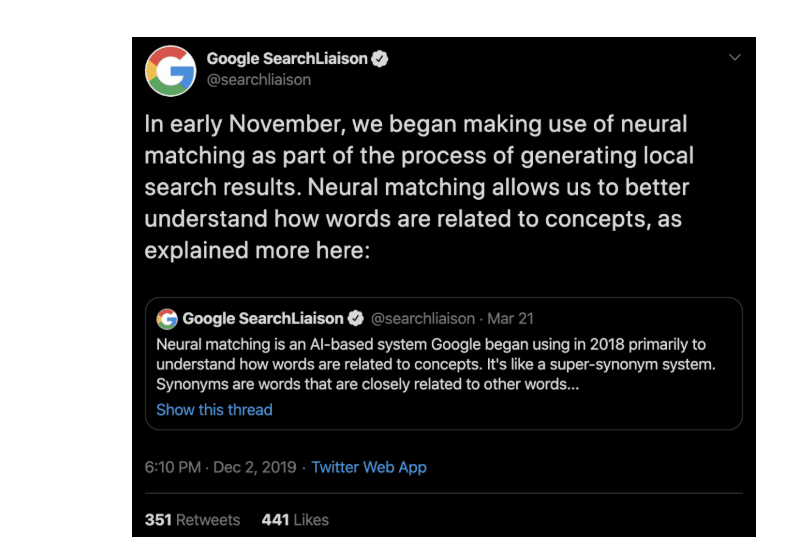What is a Google’s Neural Matching
Ever turned to Google for answers but are clueless about the exact words you are searching for? Were you still able to find relevant content? The most probable answer is, “Yes.” Well, Google’s neural matching makes this possible. You can match any vague or ill-defined descriptive language to specific concepts. Information Age predicts that this AI-based system will be significant to future businesses. Neural matching has the potential to revolutionize our products through better customer targeting. So, if you are a marketer or an SEO expert, you should familiarize yourself with this technology. Better yet, acquaint yourself with this AI system’s implementation. We’ll help you learn more about Google’s neural matching.
Quick Links
Understanding Google’s Neural Matching?
Neural matching is an algorithm that helps Google relate words to searches. The tech giant has been using this system since 2018 to connect words to concepts. Sullivan, the search liaison for Google, refers to it as a “super-synonym” system. Thus, even if you use vague words in your search query, Google can still return relevant content. This AI system’s use continues to grow. Google reports that today, it is valuable in addressing 30% of all search queries. There is still a gap in understanding exactly how neural matching works. Thus, when you need help to explore professional custome essays, EduJungles can help you craft a research paper.
Does Google Use Published Algorithms?
Google uses different algorithms when delivering pages that are ranked by relevance. These Google algorithms are often not published in patents or papers. But, the tech-giant also uses an unspecified number of published algorithms. It has become challenging to track these algorithms over time. The primary reason is that Google keeps updating them every year because of its rapid growth.
Google’s Discussion of the New AI Algorithm
On Sept 24, 2018, Google’s Danny Sullivan made several tweets about the new AI-based system. In his discussion, he addressed the public’s questions about neural matching. He further differentiated it from an earlier Google AI-based system- RankBrain. Sullivan also highlighted new Google features that use neural learning to improve searches. He emphasized on the latest activity cards that Google was introducing. They allow users to look at past content that relates to their current search query.
Why Google’s Neural Matching matters
This AI system shows that searching is ready to go beyond the confines of keywords and backlinks. For example, take a search query like define neural on Google Search. One doesn’t need these specific sets of words to retrieve relevant content. Similar words should suffice. With synonyms as a base in neural matching, users, and search engines will share a common language. Since Google improves every day, there will be more optimization of content. Thus, neural matching matters since it will meet user expectations through richer content.
Document Relevance Ranking Does Not Use Links
Search Engine Journal confirms that Document Relevance Ranking is not reliant on links. But, it still starts with traditional ranking factors before moving to the Ad-hoc part. The first part of the algorithm is counted as a vetting function. Its primary purpose is getting rid of spam and collecting the most relevant results. The second Ad-hoc part is a re-rank of the web pages according to the new criteria of “super-synonyms.” Using ranking signals in this matching algorithm differentiates it from DRMM.
How Google Uses Neural Matching
Since the start of its use in 2018, Google has used this system in various ways.
- Google has used the system in generating different search results.
- Its AI capabilities have contributed to a better understanding and analysis of language.
- Google Search can now rank documents according to relevance. The AI-based system’s use of Document Relevant Ranking has been helpful to Google. Thus, Google can avoid irrelevant results while tracking the best search ones.
Is This Neural Matching?
The most crucial bit of neural matching is ranking with the latest algorithms. Publishers must ensure that they rank results only by webpages and search queries. Thus, they avoid generating results ranked by traditional factors like links and keywords. The algorithm promotes synonyms for match and understanding how content helps a user. The result is that users get the most relevant results despite a vague description.
Configure google analytics
Google Analytics is essential in web and app tracking. If you want to measure the number of users who visit a specific website, you will need to set up and configure GA. Configuring GA can be challenging for beginners. If stuck, get help from an expert web analyst. You can also get a pre-written essay on any of your assignments. Professional essay samples can be very useful while writing essays. Our five-step guide should do the trick.
- Begin by setting up a Google Tag Manager. Here, you create an account on the manager’s dashboard and fill the necessary details.
- Sign in/Up for a Google Analytics Account.
- While using the tag manager, go ahead and set up an analytics tag. This tag will help to track the data you want to collect.
- Using the KPIs of your business or website, set the GA goals.
- Finally, link it to the Google search console by using the Admin dashboard.
What is RankBrain?
RankBrain, a Google AI-based system, aids relate pages to concepts. You notice the slight difference between the two- RankBrain and Neural Matching. Sullivan made an effort to differentiate the two after people demonstrated concerns. It is simple. The former relates pages to concepts, while the latter connects words to searches. But, of the two, RankBrain has been in use for longer. Note that this AI system is capable of machine learning. Thus, it can interpret queries where people did not have the exact words they used when searching. Also, its machine learning capabilities have improved Hummingbird’s accuracy in results. Its contribution to future searches, SEOs, and digital marketing is impressive. This AI-based system will keep making Google smarter and improve searching accuracy.
Artificial Intelligence is becoming better every day. With algorithm updates like neural matching, we can expect more refined searching strategies. We can look forward to more accurate results and a better understanding of languages. Also, we can anticipate meeting diverse information needs across the globe. From a broader angle, AI is promising to future-proof our SEOs. Still, there is a lot to do. But, machine learning and neural learning seem to be sprinting us to our destination. For now, Google should focus on content optimization and targeting queries. An approach to identifying what we lack will ensure further advancements.
What Are the Top 10 Web Development Tools for Beginners?
Web development is the art of building and updating web pages that Internet users Interact with.…
0 Comments13 Minutes
Does Your Branding Need A New Look?
From time to time, it’s important and necessary to check over your branding, to ensure that it is…
0 Comments4 Minutes
Essential Skills for AI-Driven Digital Marketing
Digital marketing is changing a lot. Artificial intelligence (AI) is becoming really powerful and…
0 Comments10 Minutes
A Handbook for Crafting Outstanding Email Automation Plans
Email marketing is an essential tool for communication in digital marketing platforms. Managing…
0 Comments8 Minutes
Branding – What It Means for Your Business
Every single one of us has our own personal brand. Unique to each of us, this lies in who we are…
0 Comments5 Minutes
How to Create a successful SEO campaign, without an SEO agency
The quest for industry-leading SEO can be as financially draining as it is profitable. Despite its…
0 Comments8 Minutes
Safeguarding the Digital Realm: The Role of Machine Learning in Cybersecurity
The digital realm, an expansive network of interconnected devices and data, forms the foundation…
0 Comments8 Minutes
8 Strategies for Protecting Data and Preserving Brand Reputation
Processing and collecting sensitive data are now common practices as businesses depend more on…
0 Comments8 Minutes








